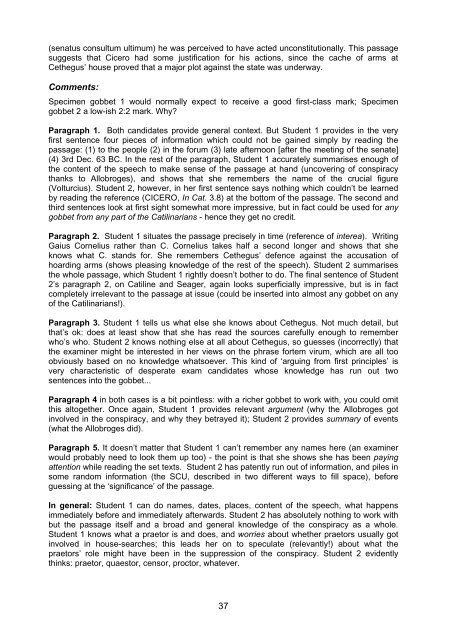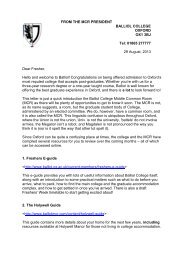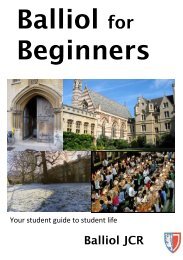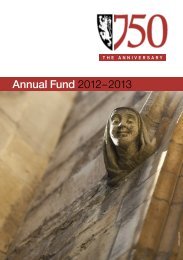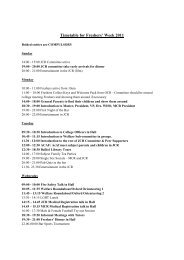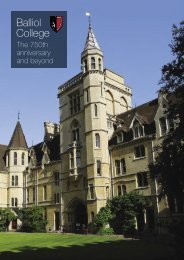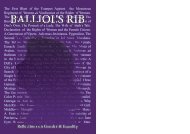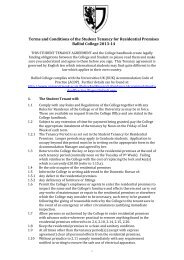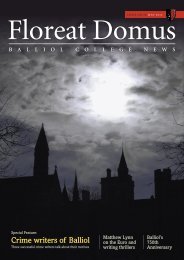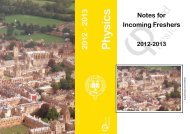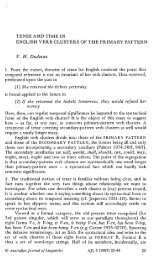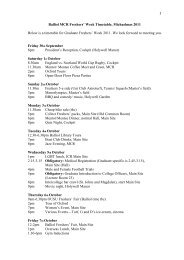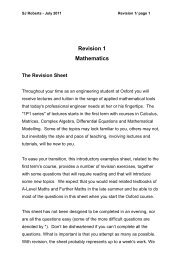CAAH Mods 2011 - Balliol College - University of Oxford
CAAH Mods 2011 - Balliol College - University of Oxford
CAAH Mods 2011 - Balliol College - University of Oxford
You also want an ePaper? Increase the reach of your titles
YUMPU automatically turns print PDFs into web optimized ePapers that Google loves.
(senatus consultum ultimum) he was perceived to have acted unconstitutionally. This passage<br />
suggests that Cicero had some justification for his actions, since the cache <strong>of</strong> arms at<br />
Cethegus’ house proved that a major plot against the state was underway.<br />
Comments:<br />
Specimen gobbet 1 would normally expect to receive a good first-class mark; Specimen<br />
gobbet 2 a low-ish 2:2 mark. Why<br />
Paragraph 1. Both candidates provide general context. But Student 1 provides in the very<br />
first sentence four pieces <strong>of</strong> information which could not be gained simply by reading the<br />
passage: (1) to the people (2) in the forum (3) late afternoon [after the meeting <strong>of</strong> the senate]<br />
(4) 3rd Dec. 63 BC. In the rest <strong>of</strong> the paragraph, Student 1 accurately summarises enough <strong>of</strong><br />
the content <strong>of</strong> the speech to make sense <strong>of</strong> the passage at hand (uncovering <strong>of</strong> conspiracy<br />
thanks to Allobroges), and shows that she remembers the name <strong>of</strong> the crucial figure<br />
(Volturcius). Student 2, however, in her first sentence says nothing which couldn’t be learned<br />
by reading the reference (CICERO, In Cat. 3.8) at the bottom <strong>of</strong> the passage. The second and<br />
third sentences look at first sight somewhat more impressive, but in fact could be used for any<br />
gobbet from any part <strong>of</strong> the Catilinarians - hence they get no credit.<br />
Paragraph 2. Student 1 situates the passage precisely in time (reference <strong>of</strong> interea). Writing<br />
Gaius Cornelius rather than C. Cornelius takes half a second longer and shows that she<br />
knows what C. stands for. She remembers Cethegus’ defence against the accusation <strong>of</strong><br />
hoarding arms (shows pleasing knowledge <strong>of</strong> the rest <strong>of</strong> the speech). Student 2 summarises<br />
the whole passage, which Student 1 rightly doesn’t bother to do. The final sentence <strong>of</strong> Student<br />
2’s paragraph 2, on Catiline and Seager, again looks superficially impressive, but is in fact<br />
completely irrelevant to the passage at issue (could be inserted into almost any gobbet on any<br />
<strong>of</strong> the Catilinarians!).<br />
Paragraph 3. Student 1 tells us what else she knows about Cethegus. Not much detail, but<br />
that’s ok: does at least show that she has read the sources carefully enough to remember<br />
who’s who. Student 2 knows nothing else at all about Cethegus, so guesses (incorrectly) that<br />
the examiner might be interested in her views on the phrase fortem virum, which are all too<br />
obviously based on no knowledge whatsoever. This kind <strong>of</strong> ‘arguing from first principles’ is<br />
very characteristic <strong>of</strong> desperate exam candidates whose knowledge has run out two<br />
sentences into the gobbet...<br />
Paragraph 4 in both cases is a bit pointless: with a richer gobbet to work with, you could omit<br />
this altogether. Once again, Student 1 provides relevant argument (why the Allobroges got<br />
involved in the conspiracy, and why they betrayed it); Student 2 provides summary <strong>of</strong> events<br />
(what the Allobroges did).<br />
Paragraph 5. It doesn’t matter that Student 1 can’t remember any names here (an examiner<br />
would probably need to look them up too) - the point is that she shows she has been paying<br />
attention while reading the set texts. Student 2 has patently run out <strong>of</strong> information, and piles in<br />
some random information (the SCU, described in two different ways to fill space), before<br />
guessing at the ‘significance’ <strong>of</strong> the passage.<br />
In general: Student 1 can do names, dates, places, content <strong>of</strong> the speech, what happens<br />
immediately before and immediately afterwards. Student 2 has absolutely nothing to work with<br />
but the passage itself and a broad and general knowledge <strong>of</strong> the conspiracy as a whole.<br />
Student 1 knows what a praetor is and does, and worries about whether praetors usually got<br />
involved in house-searches; this leads her on to speculate (relevantly!) about what the<br />
praetors’ role might have been in the suppression <strong>of</strong> the conspiracy. Student 2 evidently<br />
thinks: praetor, quaestor, censor, proctor, whatever.<br />
37


